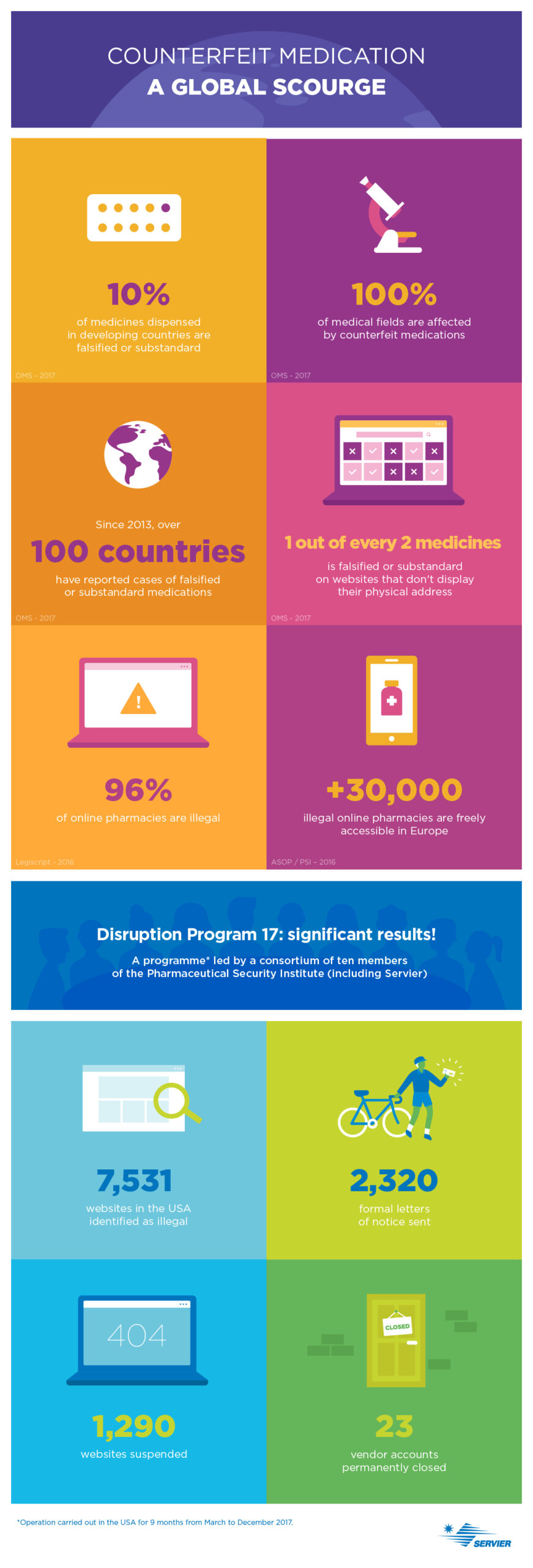The falsification of drugs is a threat to public health. It has reached a particularly worrying level in recent years and it affects all five continents, particularly sales over the Internet. This requires greater coordination of the stakeholders. The World Health Organization estimates that one in two drugs sold on the Internet is a counterfeit. For 15 years, Servier has been at the forefront of this fight against the sale of false medicines.
A networked approach
“The approach chosen by Servier consists in multiplying the captors”, explains Catherine Boudot, Director of the Trademark Department. She oversees the fight against falsification within the company. “Internally, first of all, it is a question of uniting the efforts of all the internal stakeholders concerned with this matter: Manufacturing, Regulatory Affairs, Quality, Analytical Experts – gathering all of them in a cross-functional working group. And in each subsidiary, a local representative oversees the fight against falsified products”.
Servier also conducts market surveillance in the most exposed countries: “We make targeted purchases of our medicines in pharmacies or online, to identify the potential presence of counterfeit drugs”, says Catherine Boudot.
- As Wilfrid Rogé, head of anti-counterfeiting in the Trademark Department, points out, “good internal organization is nothing without cooperation with state services and associations”. Thus, Servier also works with a network of external contacts, favouring cooperation with the customs, police and health authorities and joint action with other pharmaceutical companies, particularly through associations such as G5, EFPIA and PSI (Pharmaceutical Security Institute).
Awareness-raising campaigns
Thus, in order to raise awareness and inform patients and the various stakeholders about the issues involved in the falsification of medicines, Servier is involved in various campaigns, in particular one conducted since 2017 by PSI, a US-based institute which aims are:
- Collecting data from member laboratories,
- Sharing information on counterfeit medicines,
- Promoting legal action by the competent authorities.
In 2017, PSI set up a program called Disruption 17. Developed to reduce the illegal sale of drugs online, this program brings together 10 pharmaceutical companies, including Servier. This has yielded significant results and it was renewed in 2018.
Innovative tools
Servier has also developed innovative tools for securing its products, such as for example Securistamp, a coded digital credential printed on 11 products in Russia, China, Ukraine and Vietnam (the most at risk countries).
Another anti-forgery tool: the Matrix program, launched at Servier in 2013, to set up, by 2019, the serialisation, aggregation and unit traceability of boxes of drugs. The ultimate goal is to improve patient safety by ensuring complete traceability for each box.
Finally, at its Orléans site Servier has a team of around ten people devoted to analyzing suspect medicines, using cutting-edge technologies able to quickly decipher the information contained in a tablet, without having to destroy it.
Discover our infographic on counterfeiting


